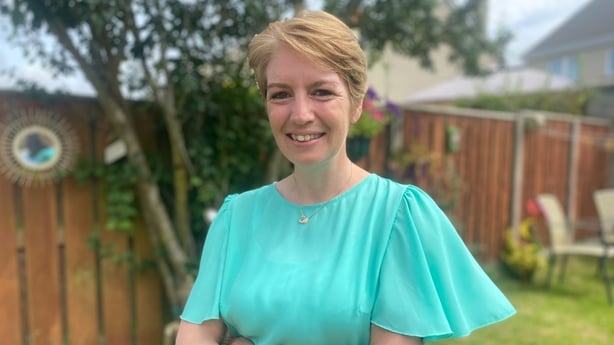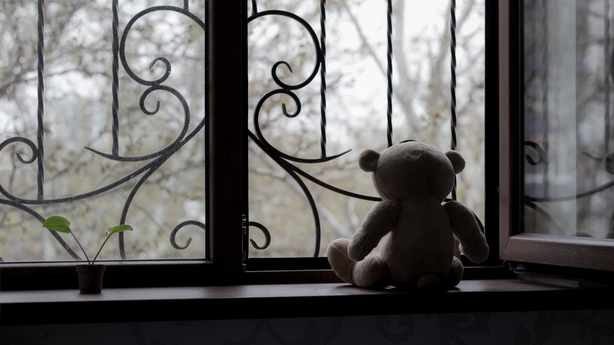A national charity that offers support to people who have experienced child sexual abuse has seen an increase in abuse amongst siblings.
Children At Risk in Ireland (CARI) said this type of abuse grew during Covid-19 restrictions when children were online more.
The charity's National Head of Therapy said children accessed information and saw pornography online, which resulted in them "experimenting and acting out on siblings".
Currently, there are 249 children on CARI’s waiting list for therapy support and services, which it said will take five years to clear unless funding is provided for psychotherapists.
Johann Callaghan is a victim of child sexual abuse. She has broken her silence about her past because she wants the stigma around this kind of abuse to end.
In her view, the public needs to discuss the issue without shame or stigma, and households need to be open with their children.

Johann's first experience of sexual abuse was at six years of age when teenagers "plied her with sweets", and she was "exploited".
"I didn't tell anybody. It was a big secret, and I was good at keeping secrets. The only trauma I had experienced at the time was that I was lied to by what I thought were 'good, decent' men. It was only later, in my 20s, that I realised this was sexual abuse."
The eldest of six children, family life was chaotic. Her father was an alcoholic and there was violence at home. Her grandmother who had dementia also moved into their three-bedroom house. Nine people in the family home meant Johann's mother had a lot to contend with.
The eldest daughter felt invisible and unloved and fell in with the wrong crowd and was "love bombed" by an older man when she was 16.
"He stalked me, he frightened the life out of me, he threatened me. I was not only afraid of him, but afraid of the crowd around him"
"This man offered me attention, I felt seen, cared for, important, worthwhile - I actually did go out with him for a time but then he turned into a monster. He raped and abused me and was very violent."
Johann knew she was pregnant and kept it under wraps.
With one bathroom and nine people in the house, daily she prepared for morning sickness with towels on standby in her bedroom to allow her somewhere to get sick.
"I was so ashamed, I felt worthless and broken. I was scared witless at the thoughts of telling my parents but in the end, I didn't have to … the local doctor did some 4-5 months later. My mother was shocked and devastated," she said.
Pregnant in her Leaving Cert year, Johann left school and stayed in a home for pregnant girls, which she said wasn't a great experience. Following her final exam, she went into labour and gave birth to a baby boy.
Back in the family home with her newborn, her abuser was still living in the area.
"He stalked me, he frightened the life out of me, he threatened me. I was not only afraid of him, but afraid of the crowd around him."
Her only way out was by working, saving and gaining financial independence. She managed to buy her own home at the age of 21.
It took Johann a long time to trust men and she eventually met the man who would be her husband. She became pregnant and wanted a "perfect" pregnancy. She felt she was "given another chance."
Tragically the little baby girl, whom Johann called Megan, "was born sleeping".

"I honestly don't know how I got through those days. I was totally broken, I felt lost, I was crying out for help, it was the darkest, most despairing time. Deep feelings that I thought I had dealt with came to the fore and it was pure hell.
Johann worked very hard on herself in the intervening years to a place of forgiveness, peace and acceptance.
She forgave her father, and also forgave her abuser. It was her belief that bitterness, anger and resentment were the "invisible chains that bind victims to their abusers forever".
"I can now look back and say I have survived, I'm grateful for the life I have now but my peace of mind has come at a big cost. I struggled for decades."
Asked how her son felt about her telling her story he told her to "go for it".
"He said, the more people that are aware of child sexual abuse and the more people can talk about, imagine the amount lives that you can save or have an impact on."
Johann is now working with CARI to advocate for children of sexual abuse. She wants parents to create an environment where children can speak and not feel ashamed.
"Because, you know, it is a shame and that's what holds people back and closes a conversation. So open that conversation, but also seek support from qualified people like in CARI."
The problem for CARI is that it is under pressure to financially support a service for which demand has risen. Its waiting list doubled in 2020 due to Covid-19 restrictions, according to General Manager Colm O'Brien.
"An empty therapy room is a sin, really, because an empty therapy room that's available is not being used is a child sitting at home in pain and in fear and a family in trauma"
"The only thing that materially changed was we were asked to stay in our homes to remain safe. But regrettably it would appear that home was the least safe place for some children to find themselves. And that's just shocking."
On one level, CARI welcomes the increase in numbers, because it shows people are willing to seek help.
"We would say that's a good sign because we need to break the silence on it. Silence is the enabler. That's what the perpetrators are relying upon, that these children are so young and so innocent that they never get found out."
Mr O'Brien commended the bravery of families that "circle the wagons and step forward and say we need help here we've got a problem."
Parallel to that CARI is aware there are others that have swept this kind of abuse under the carpet.
Despite having the physical capacity to get through the current waiting list in two years, with just 12 psychotherapists the charity's true capacity is five years.
Essentially, it needs to double the number of therapists.
"An empty therapy room is a sin, really, because an empty therapy room that's available is not being used is a child sitting at home in pain and in fear and a family in trauma. That's what we're trying to address and all we're trying to do is raise people's awareness and clearly raise funds at government level," Mr O'Brien said.
When it comes to child sexual abuse, early intervention is crucial in order to mitigate the effects of damage.
Mr O'Brien points out that the five-year waiting list means that a three-year-old may not be seen until the child is eight years old.
According to CARI’s National Head of Therapy Emer O’Neill, if children don't get help, up to 90% of them will be impacted by mental health.
"We have children as young as three years of age coming to us who have never known how to play, were never given toys. Some of them are too afraid to play, so it's important when they come into CARI that we take the therapy at their own pace."
Two therapists are required per family and child to develop a relationship with them and create a safe place, which is why, according to Ms O'Neill, "it's really important that we get funding".
For anyone impacted by this story, CARI’s care line is 0818 924 567






